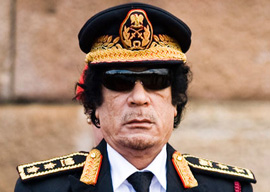
October 21, 2011

Muammar Gaddafi
In 2003, following George W. Bush’s overthrow of Saddam Hussein pour l’encouragement des autres, Kazzafi, suitably encouraged, formally capitulated to the New World Order. He agreed to give up his nuclear program (big mistake), pay reparations for past terrorism, and maybe torture terrorists for us. Soon he was holding photo opportunities with Tony Blair and similar representatives of the global great and good.
But how nonviolent is cosmopolitan internationalism in practice?
The colonel found out in March, when the leaders of France, Britain, and America agreed to kill him. Sure, they described the war they started as a “no-fly zone” to “protect civilians.” (Even after Gaffathi had been executed, a NATO spokesperson legalistically rationalized the aerial bombing of his fleeing convoy by claiming it “appeared to be attacking civilians as it made an attempt to break out of Sirte.” Yeah, sure.) But once Barack Obama decided to attack Libya, the colonel was doomed. Obama couldn’t run for reelection as the president who had started and lost a war with one of the few foreign bad guys American voters know.
While Pinker says international organizations promote peace, Buchanan emphasizes their shadow history of facilitating war (one reason peaceful Switzerland traditionally avoided them). Transnational cooperation, as with NATO, can lead to what insurance companies call “moral hazard.” Claiming to represent an international community encourages confidence when starting wars and provides opportunities for blame-dodging.
Moreover, alliances often work like subprime mortgage securitizing: The search for safety in numbers can reduce the frequency of smash-ups while increasing their intensity. This pattern of international cooperation leading to a few huge crashes can be seen both militarily and economically. The alliance systems turned 1914 and 1939 into World Wars. Granted, NATO and the Warsaw Pact didn’t fight World War III, but a .333 batting average is good in baseball, not in World War avoidance.
Similarly, the moral hazard inherent in the euro now threatens Europe with economic ruin. Nobody would have loaned the Greeks all that money if the German economy hadn’t vaguely backstopped them.
While international alliances don’t have a terrific track record of avoiding wars, they are good at winning wars. And the victors write the history books.